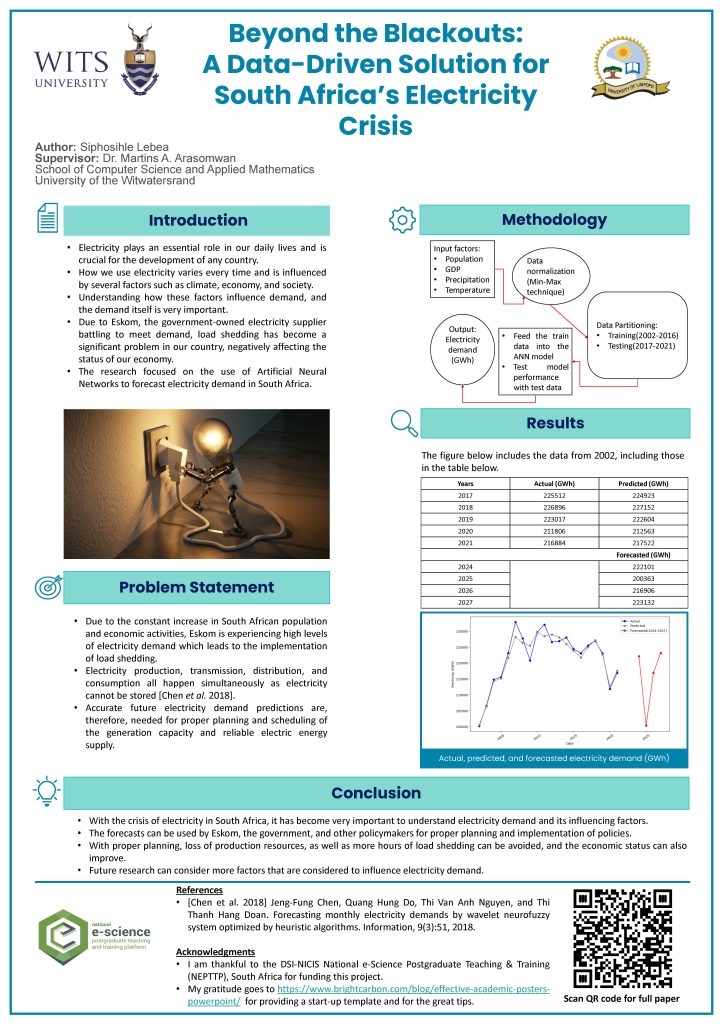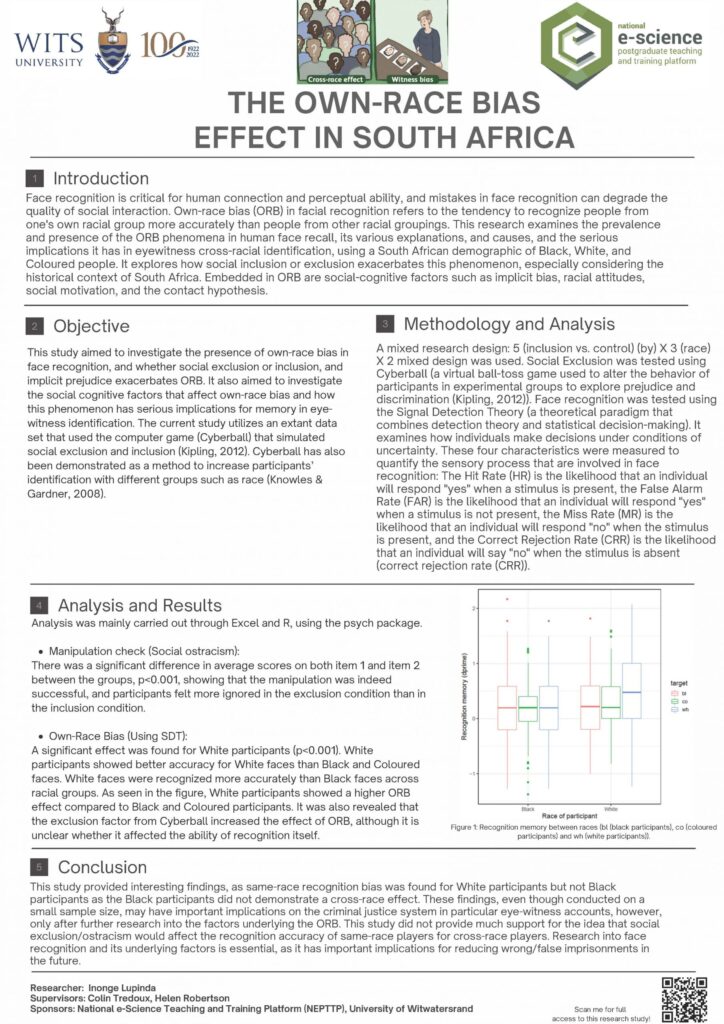Beyond the blackouts: A data-driven solutions for South Africa’s electricity Crisis
Researcher: Siphosihle Lebea, University of the Witwatersrand, Johannesburg
Supervisors: Dr. Martins A. Arasomwan, University of the Witwatersrand, Johannesburg

Researcher: Siphosihle Lebea, University of the Witwatersrand, Johannesburg
Supervisors: Dr. Martins A. Arasomwan, University of the Witwatersrand, Johannesburg

Researcher: Inonge Lupinda, University of the Witwatersrand, Johannesburg
Supervisors: Dr Colin Tredoux, University of Cape Town and Dr Helen Robertson, University of the Witwatersrand, Johannesburg
Face recognition is critical for human connection and perceptual ability, and mistakes in face recognition can degrade the quality of social interaction. Own-race bias (ORB) in facial recognition refers to the tendency to recognize people from one’s own racial group more accurately than people from other racial groupings. This research examines the prevalence and presence of the ORB phenomena in human face recall, its various explanations, and causes, and the serious implications it has in eyewitness cross-racial identification, using a South African demographic of Black, White, and Coloured people. It explores how social inclusion or exclusion exacerbates this phenomenon, especially considering the historical context of South Africa. Embedded in ORB are social-cognitive factors such as implicit bias, racial attitudes, social motivation, and the contact hypothesis.

Researcher: Octavia Ndlovu, University of the Witwatersrand, Johannesburg
Supervisor: Prof. Oliver Westerwinter, University of the Witwatersrand, Johannesburg
Link to YouTube Video
This paper gives a foundation to the first of many research paper that look into testing the relationship between good governance and the participation of Intergovernmental organisations in the type of Transnational governance initiatives. I hope to achieve these results through the use of two data sets that will be merged for the best results and that is using Transnational Public-Private Governance Initiatives in World Politics Data, together with data from Worldwide Governance Indicator. This paper doesn’t hope to achieve much beyond the scales of knowing if good governance is the reason of the participation og so much Intergovernmental organisation, I hope the results of this paper will help policy makers into making policies that will help benefit the world at a global scale, where IGOs have a good governance reason for being a part of TGIs.
Researcher: Hlayisani Khoza, University of Limpopo
Supervisor: Dr Hairong Bau, University of the Witwatersrand, Johannesburg
In the financial industry forecasting, client attrition is critical. The expense of hiring fresh clients is significantly greater than the expense of maintaining current clients. There are several Machine Learning (ML) models in use to forecast client attrition, and the results are impressive. The issue with these models is their lack of openness and interpretability. Deep Learning (DL) models are the leading models in this development because of the layered non-linear structure, which provides no insight into how they reach at their results, these strong models have been dubbed “Black Boxes”. To deal with this problem Explainable methods have been used to explain these model outcomes. In this research, Shapley Additive method has been applied to the Multilayer Perceptron model to explain its result and it has been found to explain banking customer churn better.

Researcher: Raquel Baeta, University of the Witwatersrand, Johannesburg
Supervisor: Dr Oliver Westerwinter, University of the Witwatersrand, Johannesburg
State commitment to the Single Convention on Narcotic Drugs of 1961, the Convention on Psychotropic Substances of 1971, and the Convention against Illicit Drugs and Psychotropic Substances of 1988 influence domestic regulations and the rate of drug seizures.

Researcher: Tshepiso Segone, University of the Witwatersrand, Johannesburg
Supervisor: Prof. Rod Alence, University of the Witwatersrand, Johannesburg
Agricultural development in developing countries is essential for alleviating poverty. Compared to developing countries, the rate of agricultural development in developing countries is drastically delayed. Climate-related threats to agricultural production can disturb economic processes and welfare.

Researcher: Jeremiah Ogunniyi, Sol Plaatje University
Supervisor: Dr Ibidun Obagbuwa , Sol Plaatje University
This study applied three machine learning algorithms namely Linear Regression (LR), Random Forest (RF), and Support Vector Machine (SVM) to predict precipitation in KwaZulu Natal Province, South Africa. The result shows that SVM had the best performance followed by RF and finally LR.

Researcher: Puseletso Maile, University of the Witwatersrand, Johannesburg
Supervisor: Prof. Rod Alence, University of the Witwatersrand, Johannesburg
In 2010 leaders from developed nations pledged to contribute a $100 billion year on year towards climate finance for developing countries. The reason for this is because developed countries are the biggest polluters and because developing countries are most vulnerable to climate change and because they do not have the resources to respond to extreme weather conditions. This study assesses trends in climate finance for developing countries looking at whether: There was a significant increase in climate finance after 2010. Trends in climate finance at regional level and income group level. If climate finance provided for mitigation was higher than for adaptation. And what are determinants for climate finance.
This study applied three machine learning algorithms namely Linear Regression (LR), Random Forest (RF), and Support Vector Machine (SVM) to predict precipitation in KwaZulu Natal Province, South Africa. The result shows that SVM had the best performance followed by RF and finally LR.

Researcher: Sedzani Ndou, University of Venda
Supervisors: Prof. O. Olugbenga
Breast cancer is a deadly disease mostly in women’s health all over the world, as it is considered the second most deadly cancer after lung cancer. To predict breast cancer we implement six different algorithms. We try to pick the best algorithm for this purpose by comparing their performance accuracy. What is/are the most effective machine learning algorithms for predicting and diagnosing breast cancer?

Researcher: Merriam Thoka, University of Limpopo
Supervisor: Dr Hairong Bau, University of the Witwatersrand, Johannesburg
Tree-based machine learning (ML) models are non-linear predictive models utilized today due to their accuracy and efficiency, but understanding their decisions has received very little attention. Recently, banks are adopting ML to compute credit score because utilizing ML or AI in credit scoring is attentive to real-time signs of a potential borrower’s creditworthiness. The goal of the study is to create an interpretable credit scoring model that borrowers and banks can utilize to anticipate if a lendee will be able of paying back their debt, as well as to comprehend the logic behind the model’s prediction.
